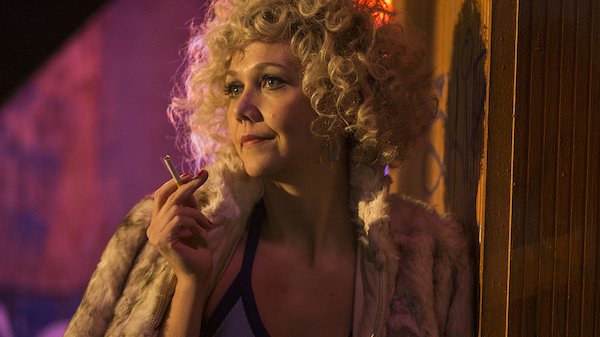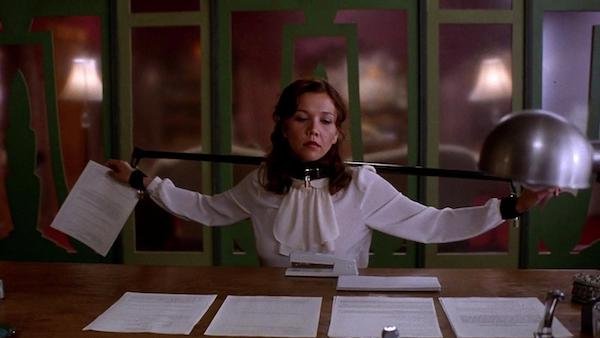Maggie Gyllenhaal has always been fascinated with unruly, complex women in her career as an actor – but her directorial debut The Lost Daughter couldn’t make more sense in terms of her path as an artist. From Waterland to Crazy Heart, Nicole Davis traces how the ugly sits alongside the exquisite in Gyllenhaal’s filmography as an actor.
“Don’t make Leda crazy.” Apparently, this was Elena Ferrante’s sole advice to Maggie Gyllenhaal before adapting Ferrante’s novel The Lost Daughter for her directorial debut.
In less dexterous hands, you can see this happening. Leda Caruso, embodied by Olivia Colman in the present and Jessie Buckley in her youth, doesn’t make things easy. Demonstrated when she refuses to move up the beach, having arrived on a Greek Island to work and sunbathe and detach, to accommodate a sprawling family from Queens who have also decamped there.
But Gyllenhaal, who first appeared in 1992’s Waterland – a Graham Swift adaptation directed by her father – came to wider attention in 2001 with Donnie Darko and has since racked up over 40 screen credits, as well as Oscar, Emmy and Golden Globe nominations, knows difficult characters. Her performances are layered with vulnerability, temerity, complexity and sometimes vulgarity. To explore her filmography is to find a world in which the ugly parts of the human experience coexist alongside the exquisite. It is this receptiveness to the more carnal aspects of womanhood – beautifully encapsulated when her character Giselle Levy in 2003’s Mona Lisa Smile says “everything is erotic” – that makes her the ideal director for The Lost Daughter.
“We are regularly fed, and regularly ingest, cultural messages that suggest that women’s rage is irrational, dangerous or laughable”, writes Rebecca Traister in Good and Mad: The Revolutionary Power of Women’s Anger. Perhaps what Gyllenhaal refers to as ‘women’s filmmaking’ is a conscious bias towards taking women’s anger - and our entire emotional kaleidoscope - seriously. Not only rationalising, but redeeming it.
Leda sounds like a raving lunatic, especially when screaming at a group of disruptive teenage boys in the local cinema, “I’m going to cut up your little dicks and feed them to the birds!”. (A distinctly Gyllenhaalian outburst. Ferrante’s Leda merely threatens to call the police). But an ear attuned to the quandary that middle-aged women face, their beauty and thus relevance fading with every furrow, could understand this rage as a rejection of society’s compulsion to minimise its older female population. Leda is determined to remain visible. Her lunacy, or rather lucidity, in her ability to make clear what she wants, then becomes an act of resistance.
Rage is something Gyllenhaal has exercised as an actor quite a bit. Take Clara, the surly theremin player in Lenny Abrahamson’s eccentric 2014 biopic Frank. “Someone needs to punch you in the face” she says to Domhnall Gleeson’s interloping keyboardist John when he is getting too comfortable in the band. A scene or two later, she is that someone. She is demanding, disdainful and, yes, sometimes dangerous and laughably so, as when she plucks a pen knife from her cleavage and later uses it to stab John in the leg. To be fair, she warned him.
Clara could be accused, as John does, of being a “cunt”. But Gyllenhaal’s performance underscores the care and protectiveness at the heart of that anger. Her venom switches to softness where Frank is concerned, suggesting a desire to keep intact the strangeness that unoriginal men like John are intent on quashing. The band’s unravelling happens at SXSW, where John suggests they play more “likeable” songs. Clara storms out, allergic to the very idea of “playing the fucking ukulele.” Her anger may read to John as mental imbalance or a lack of commercial savvy, but to any woman who has been asked to smile or present as more palatable, it is entirely reasonable.
The revolutionary power of women’s anger is rendered in high definition with Gyllenhaal’s performance as Eileen Merrell in David Simon’s three-season 70s-set 2017 drama The Deuce. Over the course of her turbulent arc as a sex worker-turned-prodigious porn director, Candy - as she is known on the streets - rails against injustice, misogyny and sexploitation many times.
In the first season, Candy suffers several blows at the hands of her customers, having traded the protection (and exploitation) of a pimp for independence. One haunting scene sees a pimp named Rodney trying to recruit her to make her “world-famous”, but when she refuses, he launches into an abusive tirade calling her “the saddest, pathetic-est, craziest bitch on this stroll.” Candy looks spiritually broken and bruised, but commits to that refusal and later pays a visit to David Krumholtz’s Harvey Wasserman, who becomes a business partner and conduit to the world of porn.
“I really don’t give a shit what people say or what they think...There is no normal. Fuck normal,” Eileen says to her paramour Hank in season three with a smile on her lips and a drink in her hand. But the fury behind it, which has lately found expression in the form of ‘femerotica’, and the degradation that has fuelled it, is clear. I suspect three years working on The Deuce sharpened, or radicalised, Gyllenhaal. It’s hard to imagine the women in The Lost Daughter – flinty, feral, flecked by a fighting spirit – without Candy. And I wonder whether Gyllenhaal’s voice as a director would be as fully formed, too, without having inhabited someone who found theirs as profoundly as Candy did.
Gyllenhaal, and The Lost Daughter’s cinematographer Hélène Louvart, are especially perceptive towards how a body can be hijacked by motherhood. At the heart of Leda’s story is an ambivalence towards her daughters. She is capable of love, but in several flashbacks where Leda juggles her work as a translator with childcare, it requires a herculean effort.
It is this fractured quality she recognises, and sympathises with, in Dakota Johnson’s Nina, a young mother who comes to the island annually with her multifarious, and new-monied relatives. “She’s driving me crazy”, Nina says of her daughter Elena, while adjusting the child who hangs off her like an appendage. The weight - emotional and physical - is all too clear. It’s a lot to be everything to someone.
As ex-convict Sherry Swanson in 2006’s Sherrybaby, Gyllenhaal gives a revelatory performance of maternal struggle. Sherry lives a hardscrabble existence and having suffered drug addiction, and then prison, she’s looking to reunite with her young daughter Alexis. When they are first reintroduced at Sherry’s brother’s house, Alexis is so excited she jumps on the sofa repeatedly yelling “Mummy”, much to Sherry’s affection-craving delight. But children are fickle, and before long Alexis is calling her “Sherry” and resisting her kisses. Sherry is unprepared for the demands motherhood makes. She can barely take care of herself and when, during a solo outing, Alexis accidentally wets herself, there is exasperation in Sherry’s voice as she attempts to wrangle Alexis into dry clothes. Gyllenhaal imbues The Lost Daughter with that same scrappy spirit. Motherhood is an exercise in providing endless tether, even when you have nothing left to give.
When young Leda is invited to a conference where a hotshot professor (Gyllenhaal’s own husband Peter Sarsgaard) references her work on Auden as being particularly exciting and inventive, she finds an outlet for that maternal ambivalence and a reason not to stay. In an industry where young women and older men are paired together recurrently, Gyllenhaal is particularly canny in framing their affair as something that Leda wants and needs as much as the professor.
That desire to be seen, heard and touched feels especially reminiscent of 2002’s Secretary, which gave Gyllenhaal her breakout role. She plays Lee Holloway, a one-time psychiatric inmate who begins working as a secretary for James Spader’s Mr. Grey. Their relationship quickly transcends the professional, into the sadomasochistic: spanking, crawling, seductive tea-serving. But rather than devolving into tasteless or sexist tropes, Lee is a willing, and at times, wilful, participant.
Gyllenhaal frequently tells a story about the scene in which Mr. Grey first asks Lee to bend over a desk to spank her. She doesn’t know what’s happening, and given that she could be at risk of dismissal if non-compliant, well, she bends over. But a few minutes later, Mr. Grey places his hand on the desk next to Lee’s and she interlocks her little finger with his. It’s a small moment, but Gyllenhaal fought to keep it in the film, aware of how much it said about consent.
As The Lost Daughter continues to prove, Gyllenhaal is more attracted to characters who run away from domesticity - Lee hot foots it from her wedding to a milquetoast husband and declares her love for Mr. Grey - and towards the strange and the sexual.
An air of unpleasantness permeates The Lost Daughter. A bowl of rotting fruit; a cicada that takes a pew on a bedroom pillow. The Greek island setting possesses all the ingredients for a gorgeous holiday but Gyllenhaal’s film is not telling that story. It’s grotesque and sinister and culminates in something especially squirm-inducing.
Gyllenhaal has a knack for creating characters that unsettle. Never more so than in 2018’s The Kindergarten Teacher. Written and directed by Sara Colangelo and adapted from the Israeli film of the same name by Nadav Lapid, she brings an uneasy intensity to Lisa Spinelli, the titular kindergarten teacher. When Lisa discovers that Jimmy, one of the five-year-olds in her class, has an aptitude for writing short but striking poems, her attentiveness to the class as a whole, and her attunement to their creative needs and minds: “to hell with the core curriculum”, transgresses into something intent and singular. She starts reading Jimmy’s poems at her own adult poetry class and begins to take him aside for private chats where she attempts to unearth new poems. A line is crossed when she gives Jimmy her mobile number and ultimately kidnaps him with the logic of wanting to cultivate his talent.
Lisa’s behaviour is treated with empathy rather than disgust. It’s perturbing when Lisa calls Jimmy around bedtime and tells him there’s nothing wrong with that. But we do not recoil from her, even when she snarkily, then sadly, tells him, “This world is going to erase you... There’s not a place in this world for people like you.” We understand, because of Gyllenhaal’s ability to communicate it, that she is talking as much about herself and her unfulfilled creative potential. Her transgression is that of a woman resisting erasure, no matter what.
It’s telling that the one role for which Gyllenhaal has received an Oscar nomination – Jean Craddock in 2009’s romantic drama Crazy Heart, directed by Scott Cooper – is one of her softer, more supplicant characters. However, there is a lovely moment where Jeff Bridges’ washed-up country star Bad Blake calls her and, in the pause before she returns his hello, all her past disappointments and heartbreaks flash before Gyllenhaal’s eyes as she recalibrates what she’s come to expect from men and what she had expected of this particular man.
To me, that’s Gyllenhaal’s magic as a performer and now director. Her characters’ regrets, desires and mistakes live close to the skin, just like the “capillaries” that Jean gives as a reason for blushing in front of Blake. She renders visible the many lives these women have led and the many hardships they have endured, in order to be who they are today. Gyllenhaal’s characters are aberrant and indignant and sad and lost. But under her direction, they are never crazy.
Nicole Davis (@stonecoledfox) is a freelance writer, podcast host and producer based in London.





